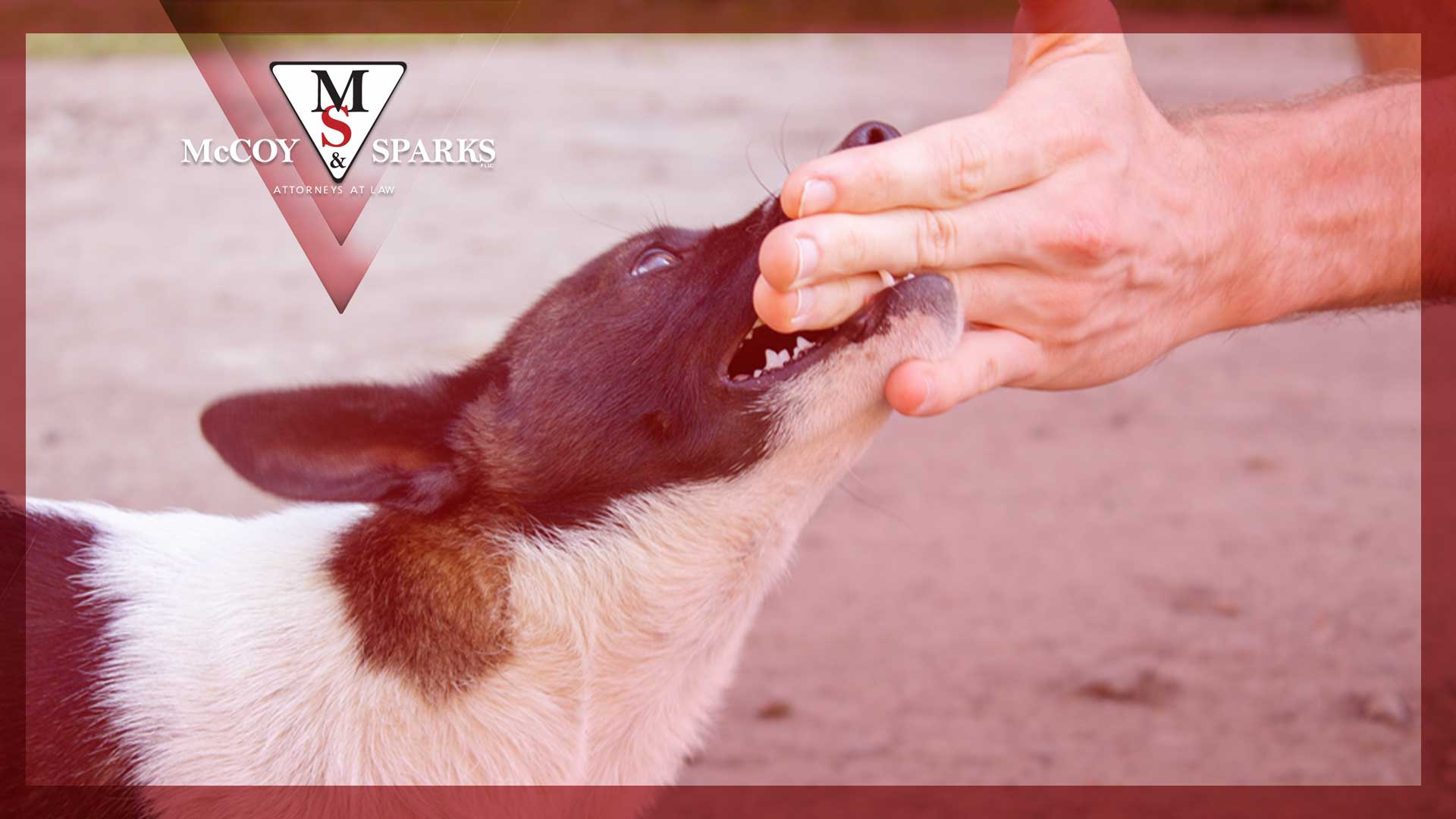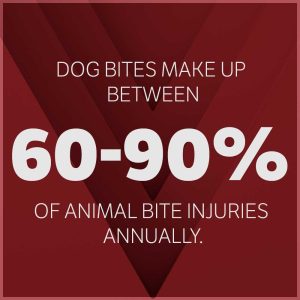
Dogs are the most popular pet in the United States, with 65.1 million American households making space for a canine companion. Neighborhood parks, city sidewalks, and even outdoor cafes are filled with dogs. A dog owner might assume that they have total control of their dog’s behavior, but dog bite wounds can occur when you least expect them.
Dog bites are exceedingly common in the United States. These attacks can leave victims with devastating injuries. According to the American Veterinary Medical Association, roughly 4.5 million people are bitten by dogs each year; tragically, 50% of dog bite victims are children, with 26% of those children requiring significant medical treatment. Nearly 1,000 people are treated in emergency departments for dog bites every day.
What Are the Most Common Types of Dog Bite Injuries?
- Lacerations: Deep cuts or tears in the skin that may require stitches or reconstructive surgery.
- Scarring: Permanent scars, often on the face, requiring multiple surgeries for repair.
- Puncture Wounds: Deep wounds from sharp canine teeth, increasing the risk of infection.
- Infections: Bacterial infections like cellulitis or septic arthritis, leading to redness, swelling, or fever.
- Capnocytophaga: Rare bacterial infection causing blisters, muscle pain, and fever.
- Tetanus: Serious infection causing jaw stiffness, muscle spasms, and difficulty swallowing.
- Rabies: A life-threatening virus attacking the central nervous system; requires immediate vaccination.
- Sepsis: A severe, life-threatening reaction to infection that can damage organs.
- Nerve Damage: Bites deep enough to sever nerves, leading to pain, numbness, or loss of function.
- Bone Damage: Crushed or broken bones that may require surgery to restore mobility.
- Amputation: Severe injuries that result in the loss of limbs or extremities.
- Emotional Injuries: Anxiety, PTSD, or depression caused by the attack or resulting physical impairments.
These injuries highlight the importance of seeking medical attention after a dog bite to prevent complications and ensure proper healing.
Joint Pain After Dog Bite
Joint pain after dog bite can be a serious and concerning symptom that may indicate underlying complications. When a dog bite occurs, bacteria from the dog’s mouth can enter the wound, potentially leading to infections like cellulitis or even septic arthritis, which directly impacts the joints. In some cases, the trauma from the bite itself can damage nearby tissues, ligaments, or joints, causing pain and inflammation. Left untreated, joint pain after dog bite can worsen and lead to long-term mobility issues or chronic discomfort. It’s essential to seek prompt medical attention to properly clean the wound, assess for infections, and ensure that any joint-related injuries are addressed to prevent further complications.
Dog Bite Damage
Dog attacks can be both physically harmful and emotionally traumatic. Any type of animal attack is terrifying, but being assaulted by a dog can leave a bite victim with crippling fear.

Dogs are so common in the US that it’s hard to avoid these usually friendly but potentially dangerous animals. As tens of millions of Americans believe dogs are an integral part of family life, you’re bound to encounter them at some point. Unfortunately, serious injuries aren’t always inflicted by a strange dog— even familiar dogs can attack. You might assume that most dog bites are inflicted by stray dogs, but
Dog bites are by far the most common animal bite injuries in the United States. They make up between 60-90% of animal bite injuries annually, with cat bites coming in between 5-20%. Sadly, dog bites can cause serious injury and even death. Dog bite fatality rates are relatively low, with 48 attacks resulting in human death in 2019, but there is a risk for serious infection.
A dog attack can leave you with numerous injuries, but there are five common injuries that occur when dogs bite. In this blog, you’ll learn about these different types of injuries as well as Kentucky dog bite laws.
Kentucky Dog Bite Laws
The state of Kentucky has statutes addressing animal bites in general, and they also dictate a dog owner’s consequences if their dog attacks. KRS 258.235 outlines many rules for owning a dog, including that “[a]ny person, without liability, may kill or seize any dog which is observed attacking any person.”
KRS 258.235 (4) states that “[a]ny owner whose dog is found to have caused damage to a person, livestock, or other property shall be responsible for that damage.” This means that, according to the law, if a dog hurts you, your child, your pet, or your property, you’re entitled to compensation from the owner.
If you or a loved one suffers from a dog bite injury, you have every right to seek compensation from the dog’s owner in civil court. You may be able to recover compensation for property damage, medical bills, lost wages, pain and suffering, and more.
What Do You Do If You’re Bitten by a Dog?

There are several steps you should take after you’re bitten.
First, it’s important that you seek immediate medical attention. You need to assess the extent of your injuries, and you need to document these injuries to provide evidence for a potential personal injury claim.
Next, you should report the event to animal control. You don’t want additional injuries to befall others in your community; it’s vital that there’s a record so appropriate action can be taken.
Identify any witnesses to the incident. Again, this is a vital part of accruing evidence for a claim you might wish to file down the road.
Take pictures and write down your recollection of the events that proceeded the injury. The sooner you record this, the more accurate it will be.
What are the Most Common Types of Bite Injuries?
Some dog bites result in minor injuries, but that doesn’t mean that they can’t be very serious. Between the risk of infection, serious skin wounds, the potential for rabies infection, and other injuries, dog bites are not something you should disregard. It’s important to seek medical attention so that you can get prophylactic antibiotics and ensure that you have a record of the dog bite incidence.
Here are some of the common injuries that occur when people are bitten by dogs:
1. Lacerations

Dog attacks frequently leave victims with serious lacerations and permanent scarring. Dog bites often require stitches and bandages, particularly if the bite wound is particularly deep and if the bleeding shows no signs of slowing down. You may even need to undergo expensive surgeries due to the bite wounds you suffer.
The most severe type of dog bite wounds are called avulsions. In these cases, soft tissues and even facial features are torn away, leaving behind skin and muscle hanging in flaps. This severe laceration would definitely require reconstructive surgery, which could increase the risk of infection.
2. Scarring
These painful and common injuries may deform the area of your body that the dog attacked, and permanent scarring is not uncommon. According to the American Society of Plastic Surgeons (ASPS), doctors performed over 28,000 reconstructive surgeries as a result of dog bites in 2015 alone.
Many victims of dog attacks suffer from permanent facial scarring, and facial deformities can be both physically and emotionally painful. Reconstructive surgery is often required, and younger children who suffer dog bites to the face could require multiple surgeries to deal with persistent scarring.
3. Puncture Wounds
Dog attacks often result in deep wounds because of the sharpness of canine teeth and claws. If a bite punctures your skin, you need to seek immediate medical attention. Puncture wounds are usually deeper than lacerations, meaning they’re more likely to cause an infection.
When you go to the doctor, they’ll likely clean and treat your wound thoroughly and also prescribe prophylactic antibiotics to prevent infection. It’s also possible you might require stitches to ensure proper management of dog bite wounds and achieve wound closure.
Protect Your Future After a Dog Bite Injury – Contact Now
4. Infection
Dog bites are especially likely to get infected because the attack involves the animal’s mouth. Any animal bites run the risk of infection, but dog bites and cat bites are most frequently seen in ERs. While it’s said that dogs have cleaner mouths than humans, that’s not necessarily the case.
According to a study, dogs have more than 600 types of bacteria in their mouths, while humans have 615. In other words, you should avoid dog bites and human bites if you hope to avoid the infection risk that comes with any animal bites. (Avoid cat bites, too, even though their mouths contain half the bacteria of a dog’s mouth.)
In addition to standard bacterial infections that will likely respond quickly to antibiotic treatment, dog bites can cause significant and unusual types of infection.
A typical infection can cause fever, pus and redness at the wound site, and swelling. In the event you notice any of these symptoms, you need to seek immediate medical attention. Infections can become life-threatening when left untreated.
5. Capnocytophaga
These unusual and severe bacterial infections are caused by the bacteria that live in a cat’s or dog’s mouth.
People who take immunosuppressants such as steroids or people with weakened immune systems among other risk factors are susceptible to this kind of infection, which exhibits symptoms such as:
- Redness and swelling at the wound site
- Blisters appearing within hours of the bite
- Fever
- Muscle pain
Antibiotics can treat this infection.
6. Tetanus
You’ve probably heard tetanus referred to as “lockjaw,’ and you might know it can result in muscle spasms as well as the inability to open your mouth.
Tetanus is an incredibly dangerous infection that enters the body through puncture wounds and can cause symptoms including:
- Jaw muscle cramps
- Muscle spasms
- Seizures
- Fever
- Stiffness in muscles
- Difficulties swallowing
Tetanus will require hospitalization, and treatment includes intravenous tetanus immune globulin drugs as well as antibiotics and potentially a respirator.
7. Rabies
Fortunately, widespread vaccination means that most domestic animals have had the rabies vaccine, so this deadly infection is much less common than it used to be. According to the National Foundation for Infectious Diseases, about 5,000 animal rabies cases occur annually, and only 10% of those cases are domestic animals. However, if you’re bitten by an unfamiliar canine, there’s no way of knowing if it has the rabies virus.
The rabies virus attacks the central nervous system and is fatal to any victim. If you’ve been bitten by a stray or even a familiar dog who doesn’t have proof of vaccination or who hasn’t been vaccinated on a routine schedule, the best thing to do is to seek a vaccine immediately. You don’t want to take the risk that you could have been bitten by an infected dog.
According to the Centers for Disease Control (CDC), someone with an infection risk of rabies should be first treated with Human Rabies Immune Globulin (HRIG) before they embark on a series of rabies vaccines. This should be administered as soon as possible after exposure in tandem with the first vaccine, and three additional vaccines should be administered on days 3, 7, and 14.
8. Sepsis
Sepsis is the result of your body’s response to severe infection; the natural infection-fighting processes that your body produces erroneously turn on your body rather than healing it, and it can lead to significant organ damage and even death.
While sepsis is dangerous (and potentially fatal) to anyone, pregnant women, young children, and older people are particularly at risk of infection. Most people who are diagnosed with sepsis have at least one underlying health risk in addition to the bacterial infection.
Symptoms of sepsis include:
- Shivering
- Shallow breathing
- Sweating
- Exacerbated symptoms from the source of infection
Another potential issue is septic arthritis— this occurs when infection spreads through the bloodstream and attacks a joint. It can cause swelling, fever, and joint pain, and it predominantly attacks the hip and knee joints.
9. Disabilities
Depending on the severity of the attack and where the animal bit you, you may suffer from permanent disabilities. Here are just a few of the disabilities endured by people who were bitten by dogs.
10. Significant Nerve Damage
When a dog’s bite punctures your skin, it’s very possible that the bite could be deep enough to sever or severely damage your nerves. This could lead to constant pain, strange tingling, or complete loss of sensation. Nerve damage could also make it very challenging to use the affected body parts— for example, if your hand is severely bitten, your ability to properly use your fingers could be impacted. Sadly, nerve damage can be impossible to reverse; this may be an issue that affects you for the rest of your life.
11. Bone Damage
Depending on the size and breed, a dog’s bite could result in crushed or shattered bones that would require surgical intervention. If the dog completely destroys the bone, breaking it into small pieces, it’s possible that your mobility could be impacted forever; this is particularly the case for small bones such as your wrists, ankles, or the delicate bones in your hands.
12. Amputation
In very extreme cases, it’s possible that animal bites can lead to amputation; dog bites are no exception to this. Again, it depends largely on the size and breed of the dog, but people have lost extremities because of bite injuries.
13. Brain Injuries
If the dog’s attack knocks you to the ground, it’s possible that you could experience a traumatic brain injury, if your head hits a hard surface or object. This could result in memory loss, cognitive impairments, balance issues, and more.
Permanent disabilities are more common in cases involving children because of their smaller frames. Sadly, some child victims of dog attacks have experienced permanent visual impairments.
14. Emotional Injuries
In addition to life-altering physical impairments, a dog bite can also leave a victim with permanent emotional injuries. Types of emotional injuries include anxiety, depression, emotional distress, and post-traumatic stress disorder.
Emotional injuries can result from a traumatic attack or from the victim’s injuries. For example, someone may suffer from depression or post-traumatic stress disorder as a direct result of experiencing an amputation after a dog attack.
These common dog bite injuries are significant and life-changing. Holding the owner of a dangerous dog responsible for your injuries is crucial to ensure your healing and protect others from possible harm in the future.
Preventing Dog Bites
Ideally, dogs wouldn’t ever bite people or even other dogs. However, that’s just not the case. Even the sweetest dogs are capable if biting if they’re stressed, sick, scared, or defending themselves from perceived threat from humans or other dogs. However, there are actions you can take that can help prevent dog bites.
Ask Permission
Even if you know the canine, be sure to ask permission to approach it. It’s particularly important to educate children in your care that they should never run toward a dog or attempt to pet it without asking first.
Avoid Direct Eye Contact
This is particularly important if a strange dog approaches you. Remain calm and back away slowly from the dog; it’s important that the dog perceives you as nonthreatening, or it could attack.
Never Put Your Face Near the Dog’s Face
Parents of small children should teach them that they should never attempt the touch a dog’s face and they should keep their faces as far as possible from the dog’s mouth.
Never Allow a Young Child Around a Dog Unsupervised
Very young children can stress out the most patient dog. Tail tweaks, ear tugs, and fur pulling are all par for the course as they’re exploring the world around them; however, this can lead to tragedy if they do this to the wrong dog. It’s important that you ensure your child’s safety, even with familiar dogs.
Read the Dog’s Body Language
If the animal stiffens at your approach, growling and snarling, it’s pretty clear that it’s not interested in further interaction. If you get the feeling that the canine is reluctant to engage with you, don’t risk provoking it.
Feed with Care
It can be dangerous to feed a canine with your fingers; it can become overexcited and accidently bite your hands. Again, this is particularly important for children to learn. A bite to your toddler’s tiny hand could be serious.
Avoid Teasing
Don’t take a dog’s toy or treat away from them while they’re actively engaged with it. Even if you have good intentions or just want to play, it can be dangerous. Also, avoid barking or growling at the animal. This can amplify their stress.
Present Your Hand
If you feel that a dog might be receptive to petting and you have the owner’s permission, slowly present the back of your hand to the dog. This allows them to sniff you safely. Don’t touch the dog, just offer your hand.
Approach Slowly
It’s imperative that you avoid running at a dog, especially an unfamiliar dog. Adults and children alike should approach any dog at a leisurely pace— running at them can put them on high alert.
Recovering Damages After a Dog Bite in Central Kentucky
If you suffer from an injury caused by a dog attack in Kentucky, you have every right to recover compensation from the dog’s owner. You can file a claim and present evidence indicating that the defendant’s dog bit you and that you suffered losses as a direct result of your attack.
Considering filing a personal injury claim in Kentucky? You need attorneys who have experience handling dog bite personal injury cases. An experienced personal injury attorney will assist you by gathering evidence and presenting your case effectively. There is no designated dog bite injury compensation amount. Your lawyer will work to maximize the amount of money you receive for your property damage, medical bills, lost wages, loss of future earnings, pain and suffering, emotional distress, and more.
For lawyers experienced in handling dog bite cases, contact the legal experts at McCoy & Sparks Attorneys at Law at 844-459-9467. You can also get a free case consultation here.

